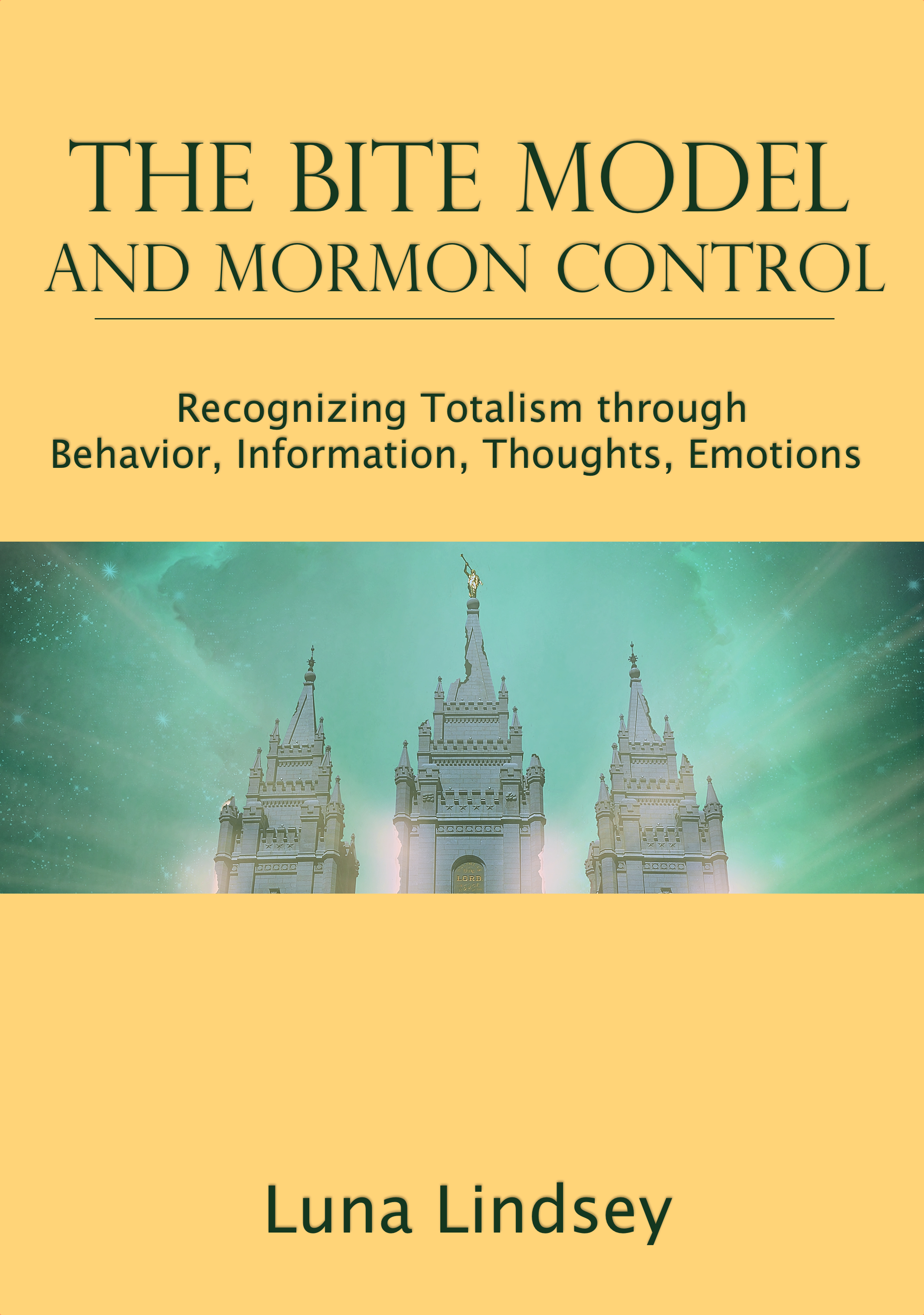Many cults completely remove a member’s support system of outside friends and family and means of making income, causing a person to be physically dependent upon the group. In many cults, members live with other members, sometimes in a buddy system, and sometimes in a group living environment. Should a member decide to leave, it becomes physically difficult to merely slip away in the night. And once out, how will the member make a living?
Mormonism encourages self-reliance when it comes to physical needs, so this is not an issue for some. Though the number of people physically dependent upon remaining in good standing was surprising to me.
Church employees, BYU faculty, and current full-time missionaries are directly dependent upon the Church, essentially sequestered from the rest of society and means of making a living on the outside. Some BYU faculty report that BYU tenure is not respected by other universities, and it is difficult to find work elsewhere. Church Education System (CES) employees have spent their lives teaching the Gospel, which is not a desired skill in secular teaching circles.
In many cases those living within the Mormon corridor are physically dependent upon the Church, as their jobs and businesses require acceptance by Mormon employers and customers. Many ex-Mormons have reported the loss of business, jobs, and homes, because they left or were excommunicated from the Church.
Additionally, women who have no occupational skills because they were obedient to Church teachings, are physically dependent upon their husbands. If their husbands are still entangled in the Church when the wife wishes to leave, she may as well be living in a cult compound.*
If you count the dependency of the wives and children, more than half of active Church membership is physically dependent upon following the Gospel.
There are other forms of dependency, and as we’ve seen in previous mind-control methods, mental forces can be as strong as physical ones. The Church creates a system of psychological, spiritual, social, and emotional dependence. On this level, dependence is a theme running through most of the other manipulation methods.
The purpose of dependency is to “…systematically creat[e] a sense of powererlessness in the person.” (Recovery from Cults, p 3)
“The superiority of the group is established through the combination of peer pressure and constant reminders of the new member’s weaknesses and vulnerabilities. The new member begins to rely on the beliefs of the group or leader for his or her future well-being.” (Captive Hearts, Captive Minds, p 42)
Once a recruit is hooked, continuing acceptance is oriented on compliance with the group’s rules and culture. The doctrine begins to entangle with the person’s sense of value. The group creates a bedrock for the individual’s sense of well-being, emotional support, cultural understanding, purpose for living, collective goals, salvation from evil, means of being good, and sense of being special.
For those who are born in the Church, this is all they know. They began physically dependent upon their family and the entire system, so the psychological dependence runs deep.
Before long, either for a new convert or a young child, the idea of leaving a person’s entire support system is abhorrent and terrifying.
The focus is on sin, weakness, and failure. The only way to overcome these things is by depending on the group, doctrine, or leader.
Ether 12:27:” And if men come unto me I will show unto them their weakness. I give unto men weakness that they may be humble; and my grace is sufficient for all men that humble themselves before me; for if they humble themselves before me, and have faith in me, then will I make weak things become strong unto them.”
This scripture does not foster self-reliance as the Church would teach regarding the material world. It does not say, “You have weaknesses, but through your own hard work and determination and study, you can turn it into a strength.” It says first you have to humble yourself, and then the Lord will make you strong.
We can also see this in the doctrine of the Atonement. We are taught repeatedly that we will always fall short of the mark, but that if we have faith, Christ will make up the difference. In this dynamic, first we’re made to believe we’re incapable of saving ourselves. This causes fear. Then we’re given hope for salvation, but it is dependent upon a big if. If we have faith. This makes us dependent up on Jesus Christ, who may as well be the same as the Church and its leadership. “…whether it be of my own voice, or the voice of my servants, it is the same.” (D&C 1:38)
This leads us to the concept of reciprocity. This is the human tendency to want to give back after we’ve received. This creates some hooks and dependence. For instance, if someone does a service project for us, we may feel obligated to do something in return. If we’re inactive, this may mean we go back to Church. If we’re active, it may mean we serve those people or others with renewed vigor.
If members of the Church have been kind to us all our lives, we may feel a sense of obligation towards — not the members themselves — but to the Church, since we’re told it is the Church that makes people so nice. If we interpret the good things in life to be blessings from the Lord, we will desire to reciprocate by trying harder to follow the commandments.
Going back to the Atonement, this reciprocity concept is stretched to infinite extremes. Jesus suffered from you, bled from every pore for your sins, and hung on the cross. “How Jesus loves us, to suffer such spiritual and physical agony for our sake! How great the love of Heavenly Father that he would send his Only Begotten Son to suffer and die for the rest of his children.” (Gospel Principles, Unit Four, Chapter 12: Jesus Christ as Our Savior).
How bigger of a sense of obligation can we have than that? This concept of debt is repeated over and over, from the pulpit, in lessons, at Family Home Evening, in hymns, and during the Sacrament.
Another method of creating dependency is to strip away confidence in personal perception. This weakens an individual’s ability to interpret the world on their own. They require the cult paradigm and doctrinal tools, to make decisions and form thought processes.
There is a strong focus in the Church on “Choice and Accountability”. It is true that every choice has a consequence, and a reality-based understanding of the effects of choices leads to wisdom. But Church doctrine exaggerates accountability. Daily decisions have dire consequences. Many members, both adults and children, wear CTR rings (Choose the Right) to remind them constantly of their responsibilities.
Stories are told of choices that turned out really badly or really well. Something as simple as accidentally emitting a swear word could cause another to apostatize because of your bad example. Or one kind word to a random stranger could save their life because they were about to kill themselves from despair.
It would seem that with all this pressure, one’s head could explode from trying to figure out what is the right choice. But there is a guiding light for making all these choices. First, follow all the commandments. Then read the scriptures. Then pray. Then listen to the Holy Ghost.
These as decision-making skills can lead to certainty through following emotions and leadership. Or it can lead to a lot of confusion and self-doubt. What is the difference between my thoughts and the Holy Ghost? Am I feeling good about this because it’s something I want, or because God wants it? Then add a third influence: that Satan and his followers are always seeking to tempt us and can counterfeit thoughts and feelings. The only fall-back plan is to follow the scriptures and the General Authorities. But what if they have nothing to say on that particular matter, or if one authoritative source contradicts another?
The scriptures say that a decision to act wrongly will cause a stupor of thought, a confusion. Instead, it is more realistic that such stupors are caused by relying on emotion, rather than reality and reason which can be verified. Or at least in cases of moral ambiguity, one can imagine realistic consequences instead of dramatic good vs evil outcomes. Usually the results of our actions aren’t so drastic as the Church leads us to believe.
The Gospel also focuses on “becoming like a child”. This places members in a dependency mindset.
Geri-Ann Galanti, while speaking of the Moonies, discussed their use of Father, Mother, Sister, and Brother terms to turn “the recruit into a child”. “…it serves to psychologically transport you to the time when socialization first occurred, thus facilitating the resocialization process.” (Recovery from Cults, p 96)
3 Nephi 9:22 “Therefore, whoso repenteth and cometh unto me as a little child, him will I receive, for of such is the kingdom of God. Behold, for such I have laid down my life, and have taken it up again; therefore repent, and come unto me ye ends of the earth, and be saved.”
Matthew 18:3 “Except ye be converted, and become as little children, ye shall not enter into the kingdom of heaven.”
* The emphasis on the family, in fact, creates a circle of dependent members, sometimes a compound of 11 or 12. The wife is physically dependent upon the husband for support. The husband emotionally dependent upon his wife and his commitments to his children. The children of course are multi-dimensionally dependent upon everyone else. This creates many of the same dynamics of living assignments in a cult. This is not to speak against the idea of familial organizations, but to show how the Church’s entrenchment into the family unit continues to enforce Church control on a daily basis.
Read more about Creating Dependency in my book, Recovering Agency: Lifting the Veil of Mormon Mind Control.



